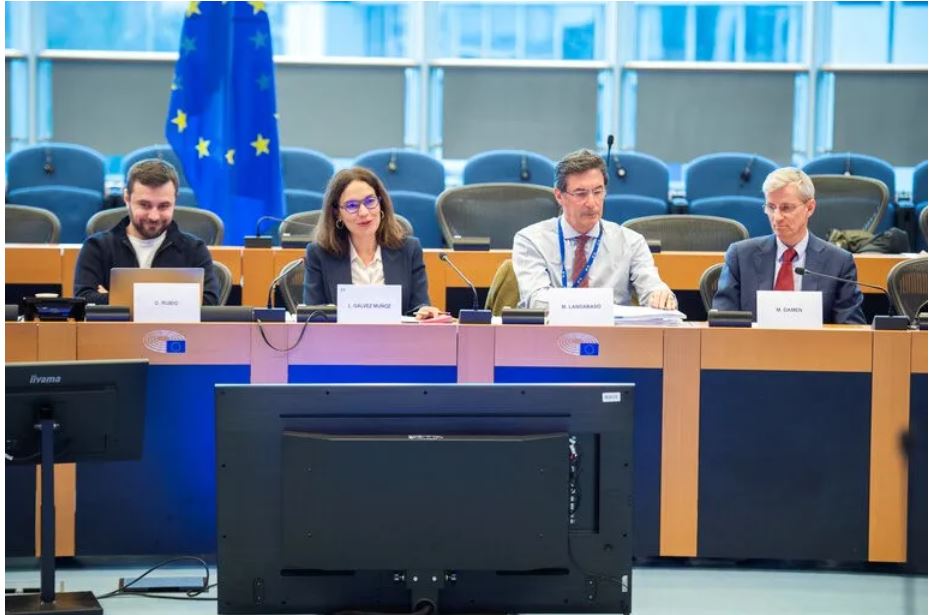To explore the future of Europe’s open strategic autonomy, the European Parliament’s Panel for the Future of Science and Technology (STOA) organised a workshop on 7 March 2023.
Written by Andrés García with Clemens Weichert.
To explore the future of Europe’s open strategic autonomy, the European Parliament’s Panel for the Future of Science and Technology (STOA) organised a workshop on 7 March 2023. Four panellists working on the topic and a full room of policy-makers, analysts, students and others made for a lively discussion. Most agreed on the need for more European autonomy, while nuanced opinions on where to focus provided some contrast.
STOA Panel Member Lina Gálvez Muñoz (S&D, Spain) opened the discussion by introducing the concept of open strategic autonomy. While strategic autonomy refers to the reduction of dependencies in raw materials and other critical parts for the industrial value chains, the qualifier ‘open’ implies a continued engagement with third parties.
Keynote speaker Diego Rubio, director of the Spanish Prime Minister’s Office for Foresight and Strategy then took the floor. He explained that the last two years have taught us three lessons: first, that history has not ended; second, that the European Union is particularly threatened by geopolitical change, because Europeans benefited greatly from the previous world order; and third, that the EU is very much able to handle the different crises it faces. However, he argued that we need new visions for the future. Fighting crises purely reactively is not enough in the long-term. Instead, it is essential to formulate a vision for how our energy systems or primary sector industries are supposed to work 30 years from now. EU countries and institutions are currently establishing foresight units to strengthen this preparedness capacity. Global competitors such as China and the USA are already far ahead in their foresight capabilities today.
Diego Rubio went on to formulate three theses, which led to an animated discussion. His first thesis is that Europe has to react swiftly, as long as it is still a major powerhouse in many areas. Marek Havrda (Czech Deputy Minister for European Affairs) subsequently underlined this urgency by noting that the centre of gravity in several research fields, such as artificial intelligence (AI), is moving from Europe to the Indo-Pacific. Alice Pannier, who heads the Geopolitics of Technology programme at the French Institute of International Relations (Ifri), and EPRS Policy Analyst Mario Damen, then took the floor to stress the roles of both the private sector and EU institutions in AI research.
The keynote speech’s second thesis was the importance of not over-reacting: a second Cold War has not yet occurred, and interdependence with other regions should not be a problem in itself. Returning to this subject, Mario Damen added that, to the contrary, in terms of military and economic autonomy, some degree of interdependence is necessary. Mikel Landabaso, panellist and Director of the Joint Research Centre (JRC) in Seville, pointed out that all foresight analysis needs to be firmly anchored in science. Consequently, the JRC operationalises what strategic autonomy means and expresses it in numbers. The JRC did this most recently in a report on the future of EU-China relations.
Diego Rubio’s third and most discussed thesis was that the EU should change the way it operates. This means searching for ways to decrease overall dependencies, instead of changing which countries it relies upon. While, during subsequent discussion, the general idea found agreement in the room, a wide range of opinions was expressed on what changes should be made. Mikel Landabaso and Alice Pannier underlined the importance of the dual transitions to green and digital technologies. Marcin Batory, of the Polish Office for the Registration of Medical Products (URPL) remarked on the role of technical expertise and education. The availability of experts is a major bottleneck in some sectors, for example in the production of advanced medical devices, where the EU has few competencies today. The stance towards third countries became a major point of debate. Marek Havrda noted many countries in the Global South have taken neutral or Russia-friendly positions regarding the war in Ukraine, which poses a difficulty for Europe. Alice Pannier responded that, while those concerns are justified, European values of multilateralism and human rights remain very attractive. In this sense, Europe’s values are an asset in diplomacy, just as US military power and Chinese manufacturing capabilities are for their respective circles of influence.
Diego Rubio made clear that the priority for the forthcoming Spanish Council Presidency would be to work with other EU governments in preparation of a European Council meeting on open strategic autonomy in October 2023. He took an optimistic tone, noting that Europe had mastered many crisis before and would do so again.
To conclude, Lina Gálvez Muñoz summarised the need for strategic foresight and open strategic autonomy in her key message: ‘We cannot make the same mistakes as in the past, we cannot go from one dependency to another’.
If you missed the conference, the full recording is available here.
Leer artículo completo en: https://feps-europe.eu/event/progressive-economics-network/

